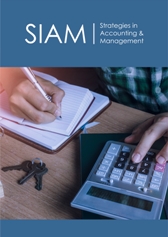- Submissions

Abstract
Psychology and Psychotherapy: Research Study
Digitalization of Accounting Learnings, and the Challenges of Gen Z Students
-
Open or CloseAgim Mamuti1*, Alborena Bakiu2 and Robert W McGee3
1Faculty of Technical Sciences, Mother Teresa University in Skopje, North Macedonia, USA
2University of Michigan, USA
3Fayetteville State University, USA
*Corresponding author:Agim Mamuti, Faculty of Technical Sciences, Mother Teresa University in Skopje, North Macedonia, USA
Submission: August 08, 2025;Published: September 18, 2025

ISSN 2639-0612Volume5 Issue5
Abstract
The modern business world relies heavily on financial strategy, vision, and their implementation. Accounting is a crucial step in this process because the modern corporate world places a lot of emphasis on their financial strategy and it is part of it. The International Financial Reporting Standards (IFRS), one of the most significant standards implemented in 2001, are one of the frameworks that have been built over time to govern and standardize accounting procedures. However, the approach to accounting education has been revolutionized and has given rise to the digitalization of accounting learning because of technology’s rapid development, particularly in the areas of information and communication.
With a specific focus on Generation Z students, who were born after 1997 and are characterized by early exposure to technology, short attention spans, multitasking skills, and a preference for instant feedback, this research paper aims to explore the prospects and challenges of digitalizing accounting education. The goal is to pinpoint methods for improving the caliber and efficacy of online accounting education and to address the challenges that Generation Z students in this digital age encounter
The first step in the study is to emphasize the significance of accounting digitalization owing to digital improvements, and its impact on the future of accounting professionals. We present an overview of the unique obstacles that the Generation Z students face as they develop their sense of identity and belonging in society. In the meantime, the literature review section explores the findings and research that can serve as a steppingstone to an efficient and optimized digitalization process. The mixed approach of both quantitative and qualitative data used is described in the methodology section.
The study’s conclusion highlights how crucial it is to modernize and enhance accounting instruction in order to prepare students for successful careers. To deliver an efficient and interesting accounting education, it’s critical to use digital learning methodologies, update course material, and take into account Generation Z students’ particular needs. Accounting educators and institutions can better educate students for the dynamic world of accounting and finance by adjusting to the demands of technology and the workforce.
Keywords: Accounting; Digitalization; Gen Z
 a Creative Commons Attribution 4.0 International License. Based on a work at www.crimsonpublishers.com.
Best viewed in
a Creative Commons Attribution 4.0 International License. Based on a work at www.crimsonpublishers.com.
Best viewed in 







.jpg)






























 Editorial Board Registrations
Editorial Board Registrations Submit your Article
Submit your Article Refer a Friend
Refer a Friend Advertise With Us
Advertise With Us
.jpg)






.jpg)














.bmp)
.jpg)
.png)
.jpg)










.jpg)






.png)

.png)



.png)






